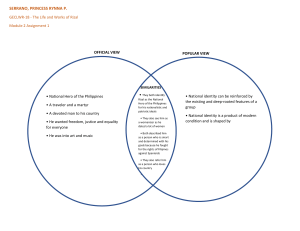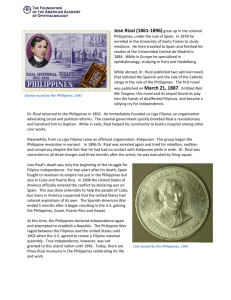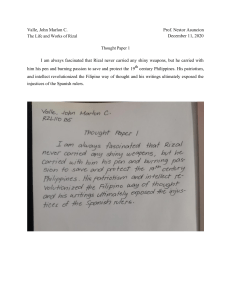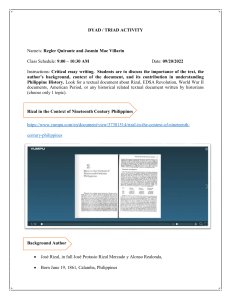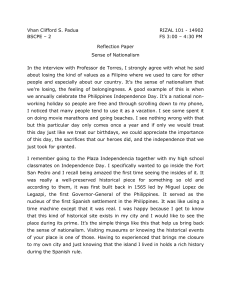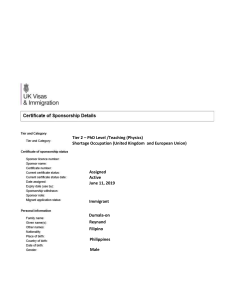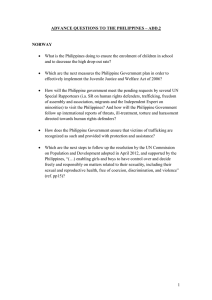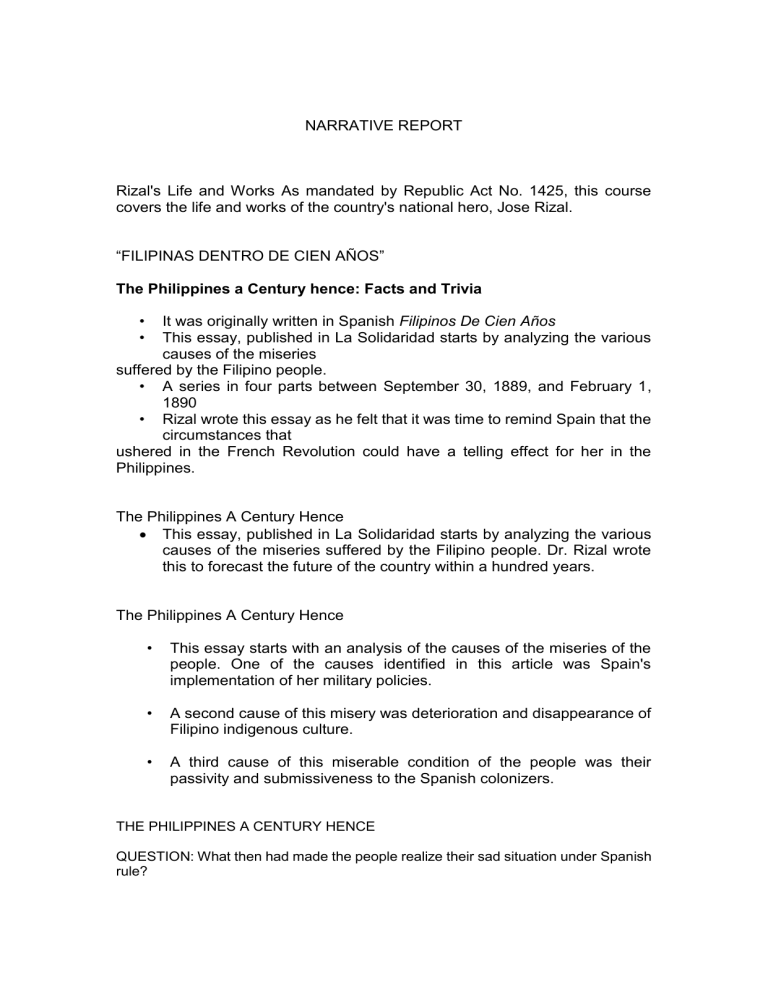
NARRATIVE REPORT Rizal's Life and Works As mandated by Republic Act No. 1425, this course covers the life and works of the country's national hero, Jose Rizal. “FILIPINAS DENTRO DE CIEN AÑOS” The Philippines a Century hence: Facts and Trivia • • It was originally written in Spanish Filipinos De Cien Años This essay, published in La Solidaridad starts by analyzing the various causes of the miseries suffered by the Filipino people. • A series in four parts between September 30, 1889, and February 1, 1890 • Rizal wrote this essay as he felt that it was time to remind Spain that the circumstances that ushered in the French Revolution could have a telling effect for her in the Philippines. The Philippines A Century Hence This essay, published in La Solidaridad starts by analyzing the various causes of the miseries suffered by the Filipino people. Dr. Rizal wrote this to forecast the future of the country within a hundred years. The Philippines A Century Hence • This essay starts with an analysis of the causes of the miseries of the people. One of the causes identified in this article was Spain's implementation of her military policies. • A second cause of this misery was deterioration and disappearance of Filipino indigenous culture. • A third cause of this miserable condition of the people was their passivity and submissiveness to the Spanish colonizers. THE PHILIPPINES A CENTURY HENCE QUESTION: What then had made the people realize their sad situation under Spanish rule? THE PHILIPPINES A CENTURY HENCE Could Spain prevent the progress of the Philippines? If Spain decide to do so, what could she possibly do: Keep the people ignorant? Keep the people in poverty? Exterminate the Filipino race? THE PHILIPPINES A CENTURY HENCE Keeping the people ignorant failed. Why? • Awakening of national consciousness among the people united them. With the spread of enlightenment, the illustrado class arose. Recourse to impoverishment also failed. Why? • Keeping the people in poverty created in the Filipinos the desire to change things. Extermination of the people as an alternative to hindering progress was an impossibility according to Rizal. Why? • The people had survived in spite of the wars they had engaged in and the epidemics that had plagued society. THE PHILIPPINES A CENTURY HENCE Can the divide et imperia or divide and rule policy still work to foster enmity between and among the natives? To Rizal, this would no longer be effective owing to the ease of movement in the archipelago brought about by improved means of transportation. Therefore, Spain has no way of blocking reforms and progress of the Philippines The Philippines A Century Hence • Rizal's essay centered on the reforms and political changes needed for the Philippines to remain under Spanish rule. Nevertheless, he stressed that reforms have to be initiated by the government for them to be peaceful and effective. • These reforms were the following: freedom of the press in the country: representation of the Filipinos in the Spanish Cortes; granting of Spanish citizenship to the people; filling of government positions through competitive examinations: and reforms in commerce, agriculture and education; and greater security for the individual and other reforms. QUESTION: Which colonizing power will replace Spain? Will it be a European power or an Asian power? • If Spain will not be replaced either by a European or an Asian power, which country then will be interested in what Spain has to give up? • To Rizal, this country is none other than the United States of America. What Rizal envisioned in this essay came true. The Americans entered the Philippines and wrestled from Spain the control of the Philippines. Contemporary Issues: Removal of Philippine History in Secondary The omission of Philippine history from the secondary school curriculum has highlighted issues with historical education that have long existed. In order to strengthen the teaching of Philippine History, it is also necessary to urge for its return to high school. The removal of Philippine history from the high school curriculum gave students more time to discuss important topics like Asian history, economics, and other topics. Additionally, this was like killing two birds with one stone because Philippine history is already incorporated into these other subjects, according to Secretary Briones. Instead of debating whether the elimination of Philippine history had a greater beneficial or negative influence, may Filipinos remember to come together for the one cause that truly matters: preparing the next generation to be contributing members of society by using the lessons learned from the past. Voters Education Vote selling or vote buying and electoral fraud are the common issues that we encounter or we often hear during campaign and election period. The lack of knowledge and awareness about the election is one of the causes of this issues. According to the Commission on Elections (Comelec), first-time voters aged 18 to 21 years old exceeded four million. The poll body also reported that young Filipino voters comprise 52 percent of the total registered voters. With the large percentage of the first-time voter, it was important to empower the youths by implementing the voters education. According to the Compulsory Voters Act of 2019, SEC, 3, "Voter education means dissemination of information, materials and programs designed to inform citizens about the specifics and mechanics of the voting process. It includes providing information on the right to suffrage, its importance, and the proper exercise thereof, as well as information on who is eligible to vote; where and how to register; how electors can check the voter lists to ensure they have been duly included; what type of elections are being held; where, when and how to vote; who the candidates are; and how to file complaints". With the voters education the youths or the first-time voters will be knowledgeable enough about election, the importance of their votes, and their rights as a voter. With this, we can avoid the issues that we encounter during elections. Reference: Study Moose. (2017.) The Philippines a Century Hence. Retrieved January 5, 2022 from https://studymoose.com/the-philippines-a-century-hence-essay https://thelifeandworksofrizal.blogspot.com/2011/08/philippines-century-hence -summary-and.html https://legacy.senate.gov.ph/lisdata/3098627850!.pdf https://mb.com.ph/2021/11/23/academic-cites-importance-of-voters-education -in-2022-elections/ https://www.researchgate.net/publication/357619390_A_Reflection_Paper_on _The_Philippines_A_Century_Hence ( Author: Jasper Abraham Gondong) Rizal, J. (1912). The Philippines a century hence. Manila: Philippine Education Co. MEMBERS: Ahmed, Amer Jason P. Belingon, Irah Mercel W. Pasion, Angelica P.

